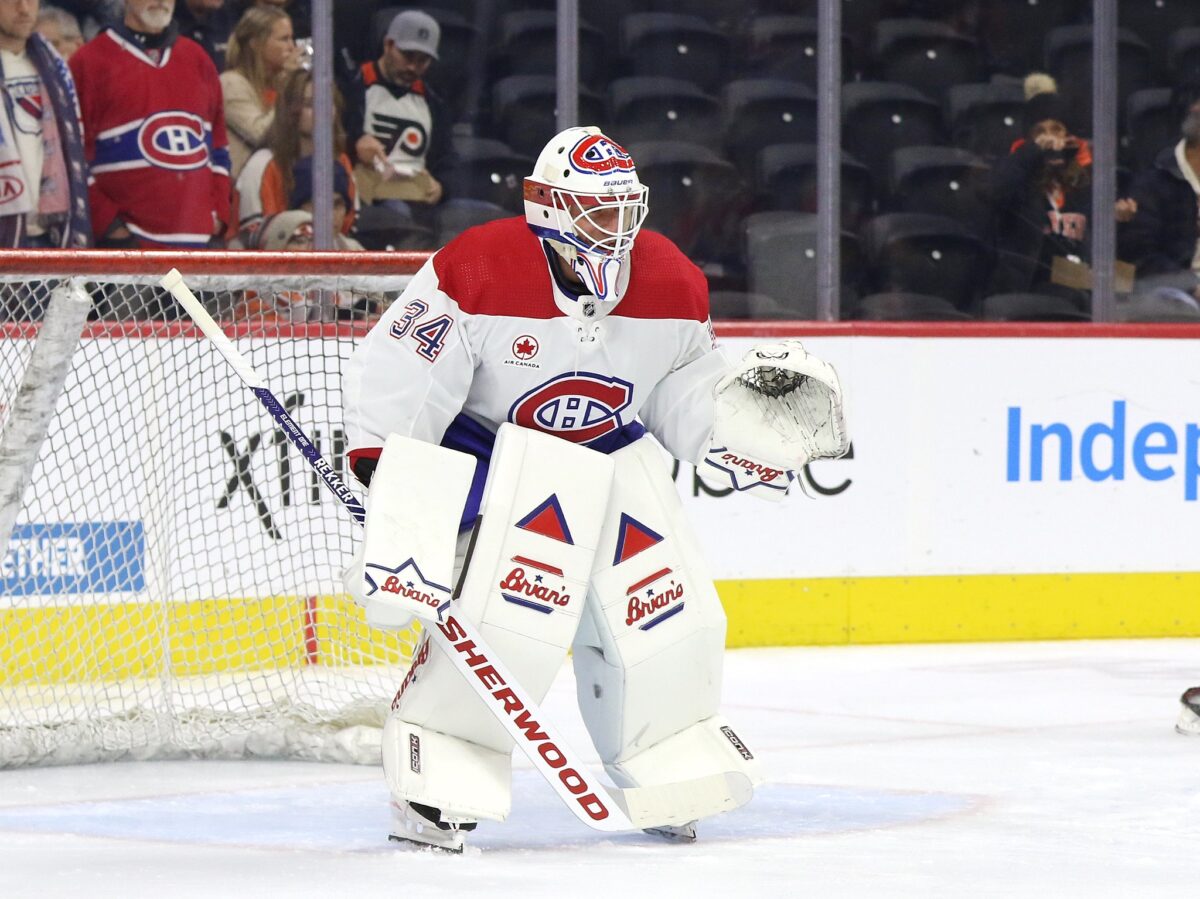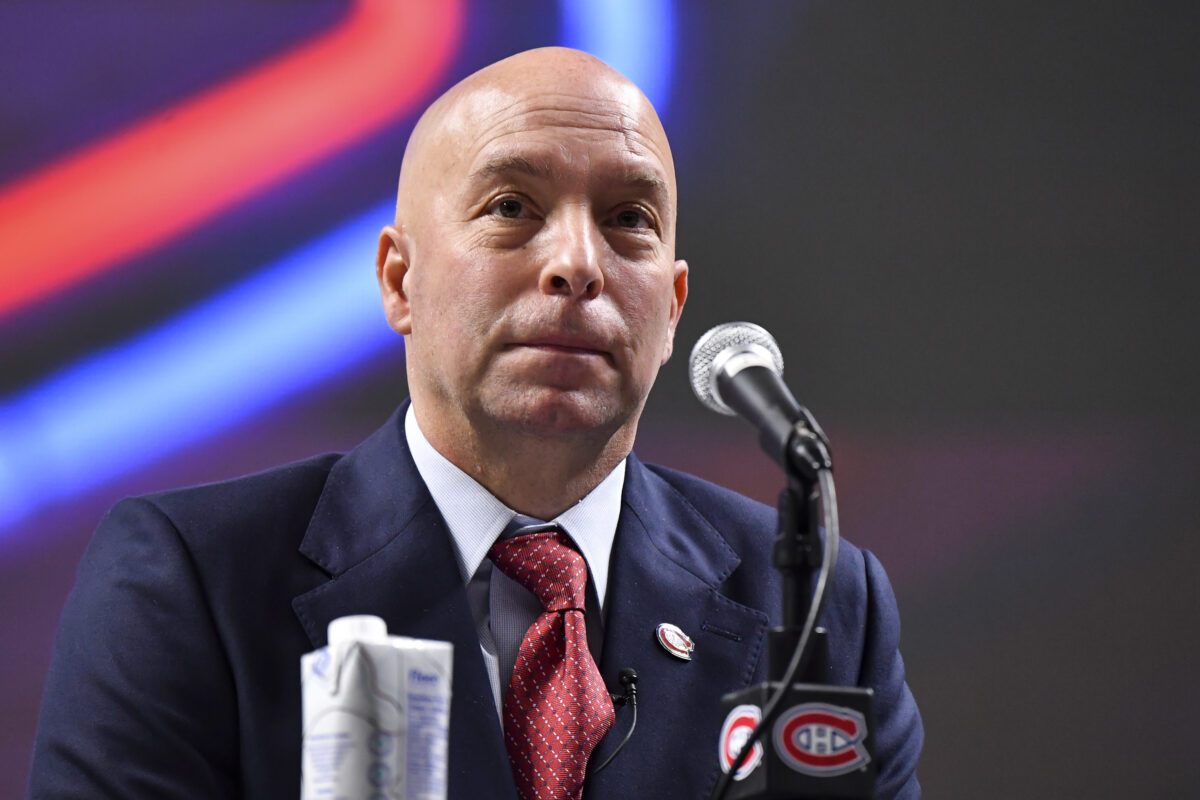The Montreal Canadiens made an important move when they traded Sean Monahan to the Winnipeg Jets for a first-round pick in 2024 on Feb. 2. During his press conference, General Manager (GM) Kent Hughes mentioned that if he was going to use his last salary retention slot this season, he wanted it to be a better deal with more value. With the trade deadline looming, Hughes has other players he could move for maximum value, or he can participate as a third party in another team’s move. Here is a look at three options for Hughes to use his final retention spot.
Trade Allen and Get the Highest Return
Rumours have been swirling about a Jake Allen trade all season, especially while the Canadiens continue to roll with a three-goalie system. Allen played very well at the start of the campaign, but since Christmas, he has been less than stellar, and many believe the system is hurting his play and his trade value. Since December, Allen has only won two of his ten starts with a .885 save percentage (SV%).
Many think that it could be too late to trade Allen, especially with the Edmonton Oilers fixing their goalie situation from within, the Carolina Hurricanes don’t seem to be in a rush to fix theirs, and the New Jersey Devils are looking for a starter. The Colorado Avalanche might need a reliable backup goalie for their playoff run, which is where Allen would fit in now – he was also a solid backup for the St. Louis Blues, where he won a Stanley Cup in 2019.

However, it would be very difficult to get maximum value for Allen as he has played poorly leading up to the deadline. Hughes will have to hope that Allen’s history of being a reliable goaltender with playoff experience will be enough to draw interest from teams. With rumours of better-starting goalies hitting the trade market, like Juuse Saros and Jakob Markstrom, getting any quality return for Allen could be a thing of the past.
But not trading Allen will force the Habs to keep going with a three-goalie system, hurting all three of their netminders. Moving Allen now and getting something close to the best value for him will likely mean Hughes has to retain half of his (just under) $4 million salary – Allen is signed until the end of next season. Any team would fare well having a quality backup – as long as he gets sufficient playing time.
Trading Pearson, Savard or Armia at the Deadline
The Canadiens have other players they can – and maybe should – try to move by the deadline, including Tanner Pearson, Joel Armia and David Savard. Pearson is on an expiring contract and would help any contending team’s bottom-six. Armia is in the same boat but has one more year left on his contract. Both have some value but not a lot and, on their own, it will be hard to move either of them.
Savard, on the other hand, has all the makings of what most contending teams want in a defenceman. His term and salary, however, could be a bit of a sticking point – he has another year left on his contract at $3.5 million.
Related: Canadiens Need to Trade David Savard to Maximize Value
Retaining some of Savard’s salary would simply guarantee a huge return for him; for some reason, NHL GMs love to overspend on big-bodied defensive defencemen at the deadline. The Canadiens could probably get a first-round pick, but if they use retention, they could get more than that. However, Hughes could also wait until next season’s deadline when he might be worth more.
Pearson has an expiring contract, which is an asset at the deadline. The issue here is that he was injured for most of the season, and his play has been sporadic at best. He looked great at the beginning of the year but then went dark until his injury. He has two points in his last three games, but in his 13 games since the end of November, he has three points. Using retention here would guarantee a trade destination and nothing more, so it would be a waste to use it on Pearson.
The perfect player to use it on is Armia – he has had a bit of a resurgence of late and could add to a contending team’s bottom-six and penalty kill. His $3.4 million salary is good for another season, but at half the value, he would be worth it as a player who can excel on the fourth line and play second and third-line minutes when needed.
Canadiens Could Use Retention to Help Other Teams
The third option, and maybe the one that gets Hughes his best return, would be to become the third party for another team. Hughes did this with Jeff Petry when he acquired a player on retention and then flipped them to another team using his retention, which significantly reduced the player’s salary for the third team. Many contending teams are up against the cap, so any salary reduction will be critical to getting a good deal done, while Hughes could use another team’s cap situation to gain valuable assets.

If Hughes can be the third party in a big trade, he could leverage his return by retaining salary on the big name being moved. He might even be able to get assets from both teams and walk away with the best return in assets, then move one of his players. Hughes has many options to get what he wants, but like any trade, it takes two to tango. If those teams want to get a trade done and have cap space, then they will have no option, and, as we have seen in the past, Hughes is a great negotiator.
Hughes could also try to move one of his high-profile players on big contracts like Brendon Gallagher or Josh Anderson. The issue here is that he would likely have to retain salary for more than one season, and both would count around $3 million against the Canadien’s cap until their contracts expire.
The best way for Hughes to use his salary retention is to trade a player with a short-term contract or help another team acquire a player with a short-term contract. This way, they won’t keep money on their cap for more than a season or two.
